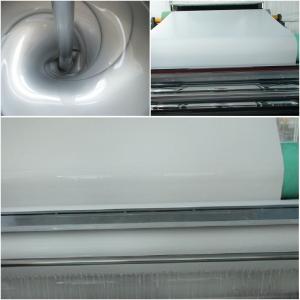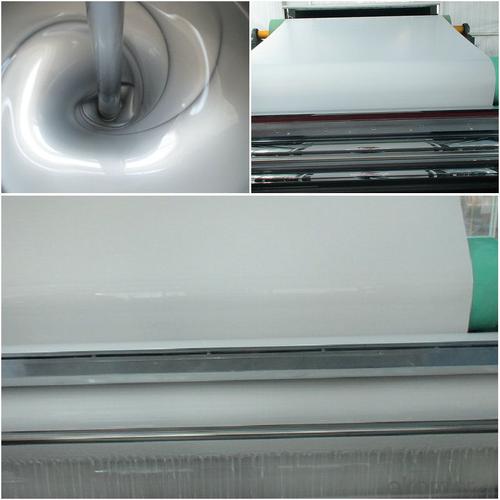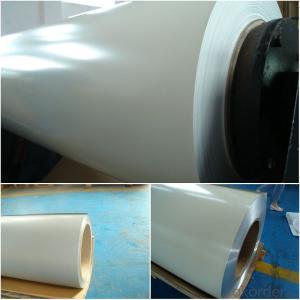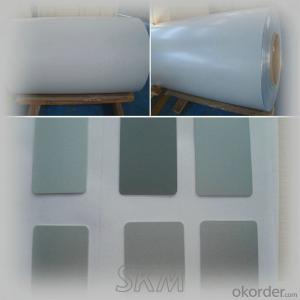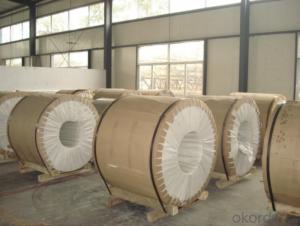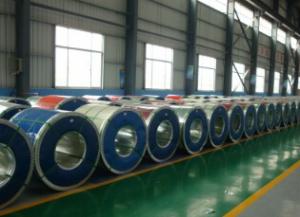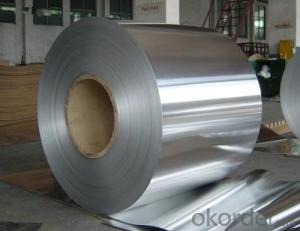Grey Color Back Coated Aluminum Coil Sheet
- Loading Port:
- China Main Port
- Payment Terms:
- TT OR LC
- Min Order Qty:
- -
- Supply Capability:
- -
OKorder Service Pledge
OKorder Financial Service
You Might Also Like
Colorcoated aluminum magnesium alloy Al-Mn
Second, the Al-Mn-Mg alloys thecharacteristics of color coated aluminum
Color coated aluminum magnesiumalloy Al-Mn alloy is used for the 3004 state of the Al-Mn-Mg aluminum alloysubstrate, after de-ester, cleaning, passivation layer processing, and thenpainting on this basis, the international most advanced level of KANAR500 andHYLAR5000 Series Fluorocarbon (PVDF) resin coating, the color coated aluminummanganese alloy known international companies use the U.S. PPG, Sweden and theUnited States Weishi Bo Beca companies paint company, its products by thenatural light exposure, Florida testing, with more than 20 years of weatheringquality assurance. Color coated aluminum magnesium alloy Al-Mn advantages ofraw materials, its products have a high strength, corrosion resistance, highweather resistance and other characteristics, and according to their owncustomers were asked to choose a different color palette, you can colorintegration, can co-exist to gorgeous effect.
Third, Al-Mn-Mg alloys the useof color coated aluminum
Our company specializes inaluminum color coated aluminum manganese alloy has been widely used in largefactories, exhibition halls, stadiums, airports, train station roof and ceilingdecorative envelope system board. Thickness of the aluminum can choosedifferent color coated aluminum magnesium alloy of manganese, by cutting,pressing, punching, bending and other follow-up molding process for large span,the larger the overall roof, wall decorative panels used in construction; Youcan also cut into small panels by bending, stamping mold, etc., for indoordecorative roof plate; also with polyurethane foam, bonded aluminum honeycombcomposite construction for energy-saving decorative wall plates.
Fourth, the development prospects
As the field of buildingdecoration materials, the continuous improvement requirements, as poorperformance of color coated steel corrosion, rust, yellow rust after a largeamount of the deficiency of serious impact on the building's overallappearance, the urgent need to develop a color plate with both strength, butalso overcome the shortcomings of color-coated steel, while there are long-termdurability of new materials, building decoration, used in airports, commercialbuildings, train stations, subways, hospitals and other architecturaldecoration. The Al-Mn-color coated aluminum magnesium alloy materials preciselymeet these requirements, with the expanding domestic demand, strengthen publicinfrastructure under the principle of color coated aluminum magnesium alloy ofmanganese will become an increasingly widespread use of aluminum, a goodprospect.
PEAluminum Coating Coils for ACP
Features of PE Aluminum Sheet:
1. Adopting precision rolling coatingtechnology, our PVDF and PE coated coil can ensure excellent adhesive withoutcoating omission.
2. For the PE coated aluminum coil weproduced, there are various colors for your choice.
3. Using infrared heating technology toprotect environment from pollution.
4. Our coated aluminum coil has four-rollercoating line, uniform coating thickness and good features.
RawMaterial of the PE Aluminum Coating Coils:
1.Aluminum Coil: high strength aluminum with alloy of AA1100 (aluminum alloy isavailable with AA3003, AA3005, AA5005 according to customer)
2. SurfacePaint: PE, PVDF and special paints.
Specificationof PE Aluminum Coating Coil
Width:20mm~1590mm
Thickness:0.06mm~1.0mm
ExternalDiameter: ≤ 1500mm
InternalDiameter: 405mm, 505mm, 150mm, 75mm
Coilweight: ≤ 4000kg
PE coatedaluminum coil is processed through the technics of roller coating and bakingwith precise polyester paints. Its color is glossy and with variety of colorsenabling you to choose easily. Chromatic aberration is small, impact resistanceis strong and easy to be processed, and all its performance has reached orsurpassed the national criteria. The products are widely used in indoor anddoor decoration, ceilings, room surface tiles, corrugated boards, wall panels, advertisement boards, counters,home appliances, decoration in and out of autos and boats.
Performanceof the coating
Aluminum Thickness | Coating Thickness | MEK | T- Bend | Impact | Adhesion | Pencil Hardness | Boiling Water Proof |
0.3-1.5mm | ≥18μm | ≥100 Times | ≤2T | 50 kg•cm | 0 Grade | ≥HB | no change within 2 hours |
0.2-0.28mm | ≥18μm | ≥100 Times | ≤2T | 30kg•cm | 0 Grade | ≥HB | no change within 2 hours |
0.15-0.18mm | ≥18μm | ≥100 Times | ≤3T | 20 kg•cm | 0 Grade | ≥HB | no change within 2 hours |
0.08-0.12mm | ≥16μm | ≥80 Times | ≤4T | 10 kg•cm | ≤1 Grade | ≥HB | no change within 1 hour |
0.022-0.06mm | ≥12μm | ≥50 Times | - | - | ≤1Grade | ≥HB | no change within1 hour |
Colorof Card
PE (polyester)
PE
ColorMatch
For custom' color requests, we can deal as following:
1. Supply a physical sample of custom color. A color sample on metal ispreferred. If other, it is also acceptable. But the color matching rate may benot good as color on metal.
2. New color sample is usually offered by our paint supplier in 5-7 days,special color should be in 7-10 days.
3. Upon receipt of color sample, please approve in writing as soon as possible.Once you approved, we will arrange purchasing and production.
Note: Color difference maybe occurred in different production batch, so it issuggested all panels are placed in one order for same project. And keep samedirection as arrow on protective film when installing to avoid any colordifference by vision
- Q: How to calculate the wall thickness with the gross weight of aluminum coil known?
- Gross weight*density=volume volume÷(aluminum sheet *width)=thickness
- Q: Are there any health risks associated with aluminum coils?
- There are some concerns about the potential health risks associated with aluminum coils. Aluminum is a common material used in the construction of coils for air conditioning and refrigeration systems. However, when aluminum comes into contact with certain acids, such as those found in some cooling agents and cleaning solutions, it can corrode and release aluminum ions into the air. Inhaling these aluminum ions may pose health risks, particularly for individuals with respiratory conditions or allergies. Additionally, there have been reports suggesting a potential link between aluminum exposure and certain health issues, such as Alzheimer's disease and breast cancer. However, scientific research regarding this connection is inconclusive and ongoing. It is important to note that aluminum is a naturally occurring element found in many foods, water, and even the air we breathe. It is also used in various consumer products, such as cookware and food packaging. To minimize potential health risks, it is recommended to ensure proper maintenance and cleaning of air conditioning and refrigeration systems to prevent the buildup of corrosive substances. Regularly changing air filters and using appropriate cleaning solutions can help reduce the risk of aluminum corrosion. Additionally, individuals with pre-existing respiratory conditions or allergies may consider consulting with a healthcare professional to determine any specific precautions they should take.
- Q: How do aluminum coils contribute to energy-efficient lighting installations?
- Aluminum coils contribute to energy-efficient lighting installations by providing excellent thermal conductivity, which helps dissipate heat efficiently. This reduces the energy consumed by the lighting system and extends the lifespan of the bulbs. Additionally, aluminum coils are lightweight, durable, and corrosion-resistant, making them suitable for various lighting applications.
- Q: What is the difference between aluminum coils and aluminum sheets?
- The main difference between aluminum coils and aluminum sheets lies in their form and application. Aluminum coils are long, continuous rolls of aluminum that are typically used in the manufacturing industry for various purposes such as roofing, insulation, and transportation. On the other hand, aluminum sheets are flat, thin pieces of aluminum commonly used in construction, aerospace, and automotive industries for applications that require a solid and stable surface. While both are made of aluminum, their physical form and intended use distinguish coils from sheets.
- Q: This question asks for methods to assess the quality of aluminum coils, which is important for various industries that use aluminum for manufacturing and construction.
- <p>To check the quality of aluminum coils, you should inspect for surface defects such as scratches, dents, or discoloration. Measure the thickness and width to ensure they meet specifications. Test the hardness and tensile strength to verify mechanical properties. Conduct a chemical analysis to confirm the alloy composition. Check for internal defects using non-destructive testing methods like ultrasonic testing. Assess the coil's flatness and straightness to prevent issues in further processing. Finally, ensure proper packaging and storage conditions to maintain coil quality.</p>
- Q: Can aluminum coils be used for radiation shielding?
- Indeed, radiation shielding can be accomplished using aluminum coils. Owing to its substantial atomic number and density, aluminum is frequently employed as a radiation shielding material, demonstrating remarkable proficiency in absorbing and dispersing radiation. It effectively safeguards against an extensive spectrum of radiation varieties, encompassing gamma rays and X-rays. Moreover, aluminum possesses the advantageous qualities of being lightweight and pliable, rendering it convenient to manipulate and appropriate for a wide range of situations necessitating radiation shielding. These encompass domains such as medical imaging, nuclear power plants, and the aerospace industry.
- Q: What are the potential applications of patterned aluminum coils?
- Patterned aluminum coils possess a wide array of possible applications across diverse industries. The construction industry, in particular, benefits greatly from the utilization of patterned aluminum coils. These coils find use in roofing, siding, and cladding applications. The patterned surface serves to augment the visual appeal of buildings while also providing added strength and durability. Another industry that can benefit from the implementation of patterned aluminum coils is transportation. These coils can be employed in the manufacture of automotive parts such as body panels, trims, and decorative accents. The patterned surface imparts a distinctive and stylish appearance to vehicles, all the while offering corrosion resistance and lightweight properties. Patterned aluminum coils can also be employed in the production of household appliances and furniture. They can be utilized to create decorative panels, cabinets, and countertops. The patterned surface can add a contemporary and sophisticated touch to these products, thereby rendering them more visually appealing to consumers. Moreover, patterned aluminum coils find applications in the packaging industry. They can be utilized in the fabrication of packaging materials such as cans, containers, and lids. The patterned surface can make the packaging more captivating, thereby aiding in attracting customers and bolstering sales. Furthermore, patterned aluminum coils can be incorporated into the production of signage and advertising materials. The patterned surface offers a unique and attention-grabbing appearance, which makes it ideal for crafting signage that stands out and effectively communicates messages. In summary, the potential applications of patterned aluminum coils are extensive and diverse. From construction to transportation, household appliances to packaging, and signage to advertising, these coils offer a versatile solution for enhancing aesthetics, durability, and functionality across various industries.
- Q: Can aluminum coils be used in heat exchangers?
- Yes, aluminum coils can be used in heat exchangers. Aluminum is a popular choice for heat exchangers due to its excellent thermal conductivity and corrosion resistance. The high thermal conductivity of aluminum allows for efficient heat transfer, making it an ideal material for heat exchangers. Additionally, aluminum's corrosion resistance ensures that the coils will remain durable and functional even in harsh environments.
- Q: What is the typical thickness tolerance for aluminum coils?
- The typical thickness tolerance for aluminum coils can vary depending on the specific requirements and specifications of the customer or industry. However, a common range for thickness tolerance in aluminum coils is typically around +/- 0.002 inches.
- Q: Are aluminum coils suitable for interior design applications?
- Aluminum coils are indeed a fitting choice for interior design purposes. The versatility of aluminum as a material presents a multitude of advantages for interior design endeavors. To begin with, aluminum possesses a lightweight nature, ensuring ease of handling and installation. This quality proves particularly advantageous for projects necessitating extensive installations or suspended ceilings. Moreover, aluminum coils exhibit exceptional durability and corrosion resistance, guaranteeing extended lifespan and suitability for high-traffic regions. Furthermore, aluminum can be effortlessly tailored and molded to meet specific design requirements, thereby offering limitless design possibilities. Additionally, the material is available in a plethora of finishes, including brushed, polished, or anodized options, which can significantly enhance the aesthetic allure of any interior space. Furthermore, aluminum emerges as a sustainable and eco-friendly alternative, given its easy recyclability and low carbon footprint relative to other materials. All in all, aluminum coils represent a pragmatic and visually pleasing choice for interior design applications.
Send your message to us
Grey Color Back Coated Aluminum Coil Sheet
- Loading Port:
- China Main Port
- Payment Terms:
- TT OR LC
- Min Order Qty:
- -
- Supply Capability:
- -
OKorder Service Pledge
OKorder Financial Service
Similar products
Hot products
Hot Searches
Related keywords
